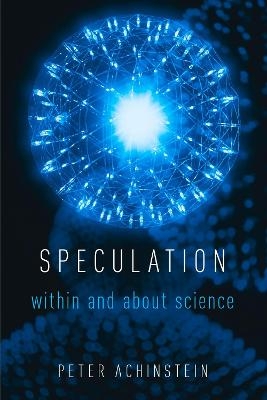
Speculation
Within and About Science
Seiten
2018
Oxford University Press Inc (Verlag)
978-0-19-061505-5 (ISBN)
Oxford University Press Inc (Verlag)
978-0-19-061505-5 (ISBN)
Newton urged scientists never to speculate, only to prove by establishing experimental facts. By contrast, Einstein urged scientists to speculate freely, since only daring speculations, not experimental facts, can advance science. Who, if either, is right? Is speculation a legitimate part of science, even in the absence of testing? If so, can speculations be evaluated without testing? How?
To answer these questions it must first be determined what counts as a speculation, a task not usually investigated by those who express strong views about speculation. In Speculation, Peter Achinstein develops the basic idea that speculating involves introducing assumptions, under certain "theorizing" conditions, without knowing that there is evidence for those assumptions. This idea is made precise by utilizing a concept of "evidence" Achinstein has introduced in previous writings and also explains here. With this concept, Achinstein defends a view according to which, by contrast with Newton, speculations are crucial in science, and by contrast with Einstein, they are subject to constraints. The latter include pragmatic ones, reflecting the particular aims of the scientist in speculating, and epistemic ones that are subject to a different standard then "evidence sufficient for belief." This viewpoint is illustrated and evaluated by critically examining historical and contemporary speculations in fundamental physics as well as more general speculations within or about science, including these: nature is simple, and simplicity is a sign of truth (Newton, Einstein); a theory can only be tested "holistically" (Duhem and Quine); and there is, and must be, a "Theory of Everything" (string theorists and reductionists).
To answer these questions it must first be determined what counts as a speculation, a task not usually investigated by those who express strong views about speculation. In Speculation, Peter Achinstein develops the basic idea that speculating involves introducing assumptions, under certain "theorizing" conditions, without knowing that there is evidence for those assumptions. This idea is made precise by utilizing a concept of "evidence" Achinstein has introduced in previous writings and also explains here. With this concept, Achinstein defends a view according to which, by contrast with Newton, speculations are crucial in science, and by contrast with Einstein, they are subject to constraints. The latter include pragmatic ones, reflecting the particular aims of the scientist in speculating, and epistemic ones that are subject to a different standard then "evidence sufficient for belief." This viewpoint is illustrated and evaluated by critically examining historical and contemporary speculations in fundamental physics as well as more general speculations within or about science, including these: nature is simple, and simplicity is a sign of truth (Newton, Einstein); a theory can only be tested "holistically" (Duhem and Quine); and there is, and must be, a "Theory of Everything" (string theorists and reductionists).
Peter Achinstein who received his B.A. and Ph.D. degrees from Harvard, is the author of seven influential books in the philosophy of science, including Particles and Waves: Historical Essays in the Philosophy of Science (OUP 1991), which received the Lakatos Award in 1993. A festschrift in his honor, Philosophy of Science Matters: The Philosophy of Peter Achinstein, was published by Oxford University Press in 2011.
| Erscheinungsdatum | 02.11.2018 |
|---|---|
| Verlagsort | New York |
| Sprache | englisch |
| Maße | 213 x 145 mm |
| Gewicht | 431 g |
| Themenwelt | Geisteswissenschaften ► Philosophie ► Erkenntnistheorie / Wissenschaftstheorie |
| Geisteswissenschaften ► Philosophie ► Metaphysik / Ontologie | |
| Naturwissenschaften | |
| ISBN-10 | 0-19-061505-2 / 0190615052 |
| ISBN-13 | 978-0-19-061505-5 / 9780190615055 |
| Zustand | Neuware |
| Haben Sie eine Frage zum Produkt? |
Mehr entdecken
aus dem Bereich
aus dem Bereich
die Grundlegung der modernen Philosophie
Buch | Softcover (2023)
C.H.Beck (Verlag)
18,00 €
Buch | Softcover (2023)
Reclam, Philipp (Verlag)
7,00 €


![Was heißt Denken?. Vorlesung Wintersemester 1951/52. [Was bedeutet das alles?] - Martin Heidegger](/media/113619842)